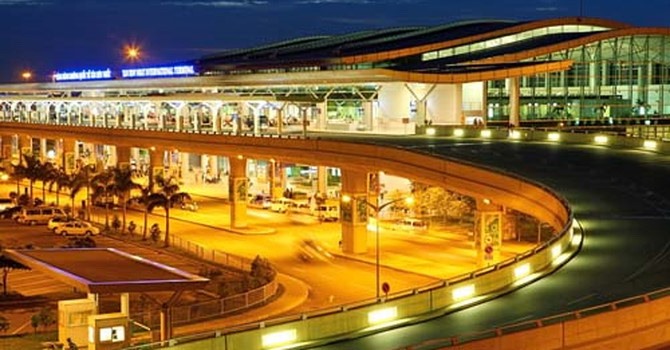 Society
Society

Priority will be given to building anti-flooding works first in the expansion project of Tân Sơn Nhất international airport in HCM City, under a new plan approved recently by the Ministry of Transport.
 |
| Tân Sơn Nhất international airport in HCM City’s Tân Bình District. Under a new plan, a new international airport T3 terminal will be built. Photo courtesy of Tân Sơn Nhất International Airport |
HCM CITY — Priority will be given to building anti-flooding works first in the expansion project of Tân Sơn Nhất international airport in HCM City, under a new plan approved recently by the Ministry of Transport.
The plan, which includes a call for investors, was submitted by the ministry yesterday to PM Nguyễn Xuân Phúc.
Work on a reservoir with a state-of-the-art pumping system, which will combat flooding in the airport area, must begin within this year and be completed before 2019, the ministry said in its report.
The new terminal must be completed before 2022, while the upgrade of runways, taxiways and auxiliary facilities must be implemented in the next two years, according to the ministry.
The total cost of VNĐ4.46 trillion (US$191 million) for these upgrades would be covered by funds from airport operations and the Government’s budget.
In addition, the ministry said it would announce a list of construction projects that need funds in the northern area of the airport, including an airplane maintenance area, and facilities for food, gasoline, cargo and logistics services.
The ministry has asked agencies to mobilise a total of VNĐ25 trillion ($1.07 billion) for the expansion project.
Airports Corporation
The Ministry of Transport appointed the Airports Corporation of Việt Nam JSC (ACV) to complete the major work of the expansion project.
ACV will build the T3 terminal, enlarge the apron and sewerage systems, and build a reservoir, pumping station, taxiways, and runways.
Land for the construction should be cleared by next year so that work can be completed in 2022, the ministry said.
The ministry chose ACV to do the work because it would take too long, up to two years, to find an investor under the PPP (Public – Private Partnership) mode, and thus would delay completion of the project.
ACV has invested in infrastructure at 21 airports around the country.
According to Lại Xuân Thanh, ACV chairman, the company has funds of over VNĐ36 trillion to build the Long Thành International Airport in Đồng Nai Province.
ACV this year is focused on five major tasks: a feasibility study for Long Thành Airport to be submitted to the ministry next June, a pre-feasibility study to enlarge Tân Sơn Nhất Airport, and feasibility studies for a terminal each at Cát Bi (Hải Phòng), Vinh (Nghệ An Province) and Phú Bài (Thừa Thiên – Huế Province) airports.
Besides using its own funds, the company also plans to borrow from banks and invest in projects jointly with other entities.
The ministry has also called on the Government to instruct HCM City to build roads, reservoirs, parks, and a sewage system outside the airport.
The Ministry of Transport has approved a detailed plan to expand Tân Son Nhất both northward and southward to serve 50 million passengers a year by 2020.
The expansion will increase the airport area by 246 hectares to more than 791ha.
Terminals T1 and T2 will be expanded to serve 30 million passengers a year, while T3 to the south will accommodate 20 million.
An additional eight taxiways will be built to speed up aircraft take-offs and landings.
At least 56 aprons will be added in front of the T3 terminal and to the southwest of the airport, increasing the total number to 106.
Tân Sơn Nhất, the country’s busiest airport, has become seriously overloaded both on the ground and in the air, forcing many flights to wait to land.
The airport, which has a designed capacity of 25 million passengers, handled over 36 million passengers last year. — VNS




